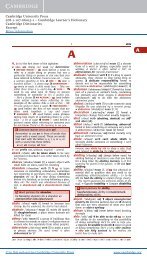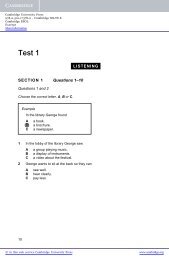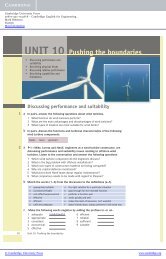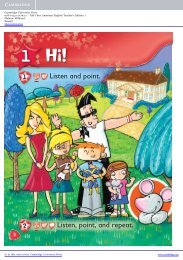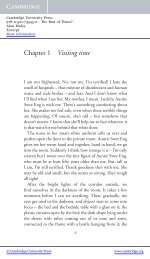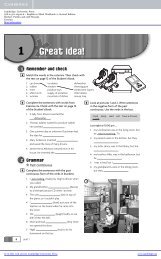Growin up
Growin up
Growin up
Create successful ePaper yourself
Turn your PDF publications into a flip-book with our unique Google optimized e-Paper software.
Cambridge University Press<br />
978-0-521-15609-7 - English in Mind Student’s Book 2, Second Edition<br />
Herbert Puchta and Jeff Stranks<br />
Excerpt<br />
More information<br />
40<br />
5<br />
Read and listen<br />
a Where is the man in the<br />
picture from? What do<br />
you think he has got on<br />
his back? Read the text<br />
quickly and check your<br />
ideas.<br />
b CD1 T25 Read the text<br />
again and listen. Answer<br />
the questions.<br />
1 What is special about the<br />
place where the Niowra<br />
tribe lives?<br />
2 What do the Niowra<br />
believe?<br />
3 What is ‘The Crocodile<br />
Nest’ and why do the<br />
boys go there?<br />
4 What do the boys do<br />
during the ceremony?<br />
5 How does a boy’s<br />
life change after the<br />
ceremony?<br />
c Do you know of any<br />
ceremonies for teenagers<br />
to become adults in other<br />
countries? Are there any<br />
in your country?<br />
UNIT 5<br />
© in this web service Cambridge University Press<br />
<strong>Growin</strong> <strong>up</strong><br />
Present simple passive<br />
let / be allowed to<br />
Vocabulary: describing a person’s age<br />
When does a teenager become an adult? In many countries,<br />
it happens on your 18th birthday, but in some parts of the<br />
world, you have to do something special to enter the world of adults.<br />
On the island of Papua New Guinea, the Niowra tribe lives near<br />
the Sepik River, which is full of crocodiles. The people believe<br />
that crocodiles made the Earth and its people. When it is time for<br />
teenage boys to become men, a ‘crocodile ceremony’ takes place.<br />
The boys are taken to a hut called ‘The Crocodile Nest’. The hut is<br />
full of crocodile teeth and skulls. The boys are told to think of their<br />
crocodile ‘fathers and mothers’ to help them to be strong and brave.<br />
Then they are beaten several times a day for six weeks and bamboo<br />
is used to make cuts on their chests and their backs. The boys play<br />
the drums together during their time in the hut – this helps them to<br />
feel that they are not alone. The Niowra believe that this ceremony<br />
makes the boys stronger and braver, so that they can survive in<br />
the dangerous forest. They also say that the boys don’t feel the<br />
pain if they believe in their crocodile ‘fathers and mothers’. And<br />
the amazing thing is that some of the boys sleep through the most<br />
painful parts of the ceremony!<br />
When the ceremony is<br />
over, there is singing<br />
and dancing and the<br />
crocodile men are given<br />
adult responsibilities in<br />
the village.<br />
www.cambridge.org
Cambridge University Press<br />
978-0-521-15609-7 - English in Mind Student’s Book 2, Second Edition<br />
Herbert Puchta and Jeff Stranks<br />
Excerpt<br />
More information<br />
2 Grammar<br />
Present simple passive<br />
a We form the present simple passive with the verb be + the past participle of<br />
the main verb. Look at the examples.<br />
b<br />
The boys are taken to a hut … bamboo is used …<br />
Underline other examples of the present simple passive in the text on page 40.<br />
c Read the rule and complete it with is important or isn’t important. Then<br />
complete the grammar table.<br />
RULE: Use the passive when it who does the action, or<br />
when we don’t know who does it.<br />
Positive Negative Question Short answer<br />
A boy is taken to a hut. Bamboo isn’t (is not) used. bamboo used? Yes, it .<br />
The boys taken there. Knives (are not) used. knives used? No, they .<br />
d Complete the sentences with the present simple passive form of the verbs.<br />
Check with the list of irregular verbs on page 127.<br />
1 Millions of pizzas are eaten (eat) in the world<br />
every year.<br />
2 How many emails (write) every day?<br />
3 Chocolate (sell) in almost every<br />
country in the world.<br />
f Look at the pictures. Make sentences about the opening ceremony<br />
of the Olympic Games. Use the present simple passive.<br />
4 Rice (not grow) in England, but it<br />
(grow) in Spain.<br />
5 most emails<br />
home computers?<br />
(send) from<br />
6 Ferrari cars (make) in Italy.<br />
e Rewrite the sentences. Use the present simple passive.<br />
1 People make jeans in the USA.<br />
4 People waste too much water.<br />
Jeans are made in the USA .<br />
Too much .<br />
2 Someone picks <strong>up</strong> the litter every morning.<br />
5 Postal workers deliver thousands of letters.<br />
The litter .<br />
Thousands .<br />
3 People cut down a lot of trees every year.<br />
6 Do they make successful fi lms in Hollywood?<br />
A lot .<br />
Are ?<br />
1 2<br />
3 4<br />
1 torch / take / to the Olympic city<br />
2 fl ag / carry / into the stadium<br />
© in this web service Cambridge University Press<br />
3 fl ame / light / with the torch<br />
4 Games / open / with a speech<br />
UNIT 5 41<br />
www.cambridge.org
Cambridge University Press<br />
978-0-521-15609-7 - English in Mind Student’s Book 2, Second Edition<br />
Herbert Puchta and Jeff Stranks<br />
Excerpt<br />
More information<br />
42<br />
3 Listen and speak<br />
a These pictures tell a story from Papua New Guinea about a man<br />
and a crocodile. Work with a partner and try to guess the correct<br />
order. Write 1–6 in the boxes.<br />
A B<br />
D<br />
b CD1 T26 Listen to the story and check your answers.<br />
4 Vocabulary<br />
Describing a person’s age<br />
a CD1 T27 Match the words with the photos. Write 1–6<br />
in the boxes. Then listen, check and repeat.<br />
UNIT 5<br />
1 a young adult 2 a child 3 a teenager 4 a baby<br />
5 a toddler 6 a pensioner<br />
A B<br />
D<br />
© in this web service Cambridge University Press<br />
4<br />
1<br />
E F<br />
E F<br />
C<br />
b<br />
C<br />
Complete the sentences with<br />
your own ideas.<br />
1 You’re a baby until you are<br />
years old.<br />
2 You’re a toddler from the age<br />
of to .<br />
3 I think you’re a child until you<br />
are years old.<br />
4 You’re a teenager from the age<br />
of to .<br />
5 I think you become an adult<br />
when you are<br />
old.<br />
years<br />
6 In my country, you become<br />
a pensioner when you are<br />
years old.<br />
c How old is someone who is<br />
middle-aged, do you think? How<br />
old is someone who is elderly?<br />
How do you say elderly and<br />
middle-aged in your language?<br />
Vocabulary bank<br />
Turn to page 113.<br />
www.cambridge.org
Cambridge University Press<br />
978-0-521-15609-7 - English in Mind Student’s Book 2, Second Edition<br />
Herbert Puchta and Jeff Stranks<br />
Excerpt<br />
More information<br />
5 Grammar<br />
let / be allowed to<br />
a CD1 T28 Read and listen to the<br />
dialogue. Then answer the questions.<br />
b<br />
Melissa: Hey Andy – what’s wrong?<br />
Andy: I really want to go to the music<br />
festival in Leeds next weekend – but<br />
I’m not allowed to go. My parents<br />
say I’m too young.<br />
Melissa: I know how you feel! I had the same<br />
problem last month – my mum didn’t let<br />
me go to the Liverpool match.<br />
Andy: Actually, my parents usually let me<br />
do things. I’m allowed to stay out until<br />
midnight at weekends.<br />
Melissa: Really? That’s cool! My mum never<br />
lets me do anything. Sometimes I think<br />
school’s better than home – at least we’re<br />
allowed to breathe at school!<br />
Andy: Does your mum let you stay <strong>up</strong> late to<br />
watch TV?<br />
Melissa: Well, yes, sometimes – but only if<br />
I’ve done all my homework!<br />
1 Where does Andy want to go?<br />
2 Why can’t he go?<br />
3 Why didn’t Melissa go to the match<br />
last month?<br />
4 What does Andy say about his parents<br />
and weekends?<br />
5 What does Melissa’s mum sometimes<br />
let her do?<br />
Look at the examples.<br />
… my mum didn’t let me go to the match<br />
I’m allowed to stay out until midnight<br />
Underline other examples of let and be<br />
allowed to in Exercise 5a. Then complete<br />
the rule with let and be allowed to.<br />
RULE: Use to say you do or<br />
don’t have permission to do something.<br />
Use to say that someone<br />
gives or doesn’t give you permission to do<br />
something.<br />
Both let and be allowed to are followed by the<br />
infi nitive: I’m not allowed to go. My mum didn’t<br />
let me go.<br />
With let, use let + person + infi nitive without to:<br />
Does she let you stay <strong>up</strong> late?<br />
© in this web service Cambridge University Press<br />
c Complete the sentences with the correct<br />
form of be allowed to.<br />
1 Look at the sign, Dad! You aren’t allowed to<br />
turn right here.<br />
2 You can take photos in the museum, but you<br />
use a fl ash.<br />
3 It’s OK to take our bikes into the park, Steve –<br />
we cycle there.<br />
4 There’s a river in our town, but we<br />
swim in it.<br />
5 My dad smokes but he<br />
smoke at home.<br />
6 you<br />
use your mobile phone at school?<br />
d Write sentences using let (someone) do.<br />
1 I don’t listen to music after midnight – my<br />
parents say no. My parents don’t let me<br />
listen to music after midnight .<br />
2 I watch the late-night fi lm on Fridays – my<br />
parents say I can.<br />
3 My brother doesn’t use my computer – I say<br />
he can’t.<br />
4 We never run in the corridors at my school –<br />
the teachers say we can’t.<br />
5 We don’t wear trainers to school – the head<br />
teacher says we can’t.<br />
6 I drive our car sometimes – my dad says it’s<br />
OK!<br />
e What are you (not) allowed to do at your<br />
school? At home? Make a list. Then talk to<br />
other people in your class.<br />
A: Are you allowed to stay <strong>up</strong> late at weekends?<br />
B: Yes, I am. Do your parents let …<br />
6 Pronunciation<br />
CD1 T29 and T30 Turn to page 110.<br />
UNIT 5 43<br />
.<br />
.<br />
.<br />
.<br />
.<br />
www.cambridge.org



